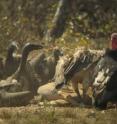Increase in Cambodia's vultures gives hope to imperiled scavengers
While vultures across Asia teeter on the brink of extinction, the vultures of Cambodia are increasing in number, providing a beacon of hope for these threatened scavengers, according to the Wildlife Conservation Society (WCS) and other members of the Cambodia Vulture Conservation Project. Researchers report that record numbers of vultures have been counted in Cambodia's annual vulture census, with 296 birds of three species found at multiple sites across the Northern and Eastern Plains of Cambodia by the Cambodia Vulture Conservation Project, a partnership of conservationists led by the Wildlife Conservation Society.
The record count means that Cambodia is home to the only increasing population of vultures in Asia. Specifically, the census indicates that the country's population of white-rumped vultures is increasing; populations of red-headed and slender billed vultures were found to be stable. All three of Cambodia's vulture species are listed as "Critically Endangered" by the World Conservation Union (IUCN).
Vulture populations in Southeast Asia are primarily threatened by the declining number of large herbivores in the region, but have been largely unaffected by a far greater threat to Asia's vultures: the veterinary drug diclofenac. Widely used as an anti-inflammatory drug for cattle in South Asia, diclofenac is toxic to vultures, causing death through renal failure and visceral gout to birds that feed on the cattle carcasses and has led to global population declines higher than 99 percent in some vulture species.
The census success follows a record breeding season for vultures in Cambodia. This year, a total of 36 vulture chicks fledged from colonies across the north and east of the country, an increase from last year's total of 19 chicks.
Vulture conservation efforts in Cambodia are the result of a number of activities promoted by the Cambodia Vulture Conservation Project. For instance, vulture nests are protected by local community members who are paid a small fee for their support. This ensures that vulture nesting success is greatly improved and also benefits local community members who often have few other sources of income during the dry season, which coincides with the vulture breeding season. Vulture food sources are supplemented by 'vulture restaurants,' feeding stations that also give visitors the opportunity to see these huge birds up close.
"By protecting nests and supplementing food supplies, we are saving some of the world's largest and most charismatic birds," stated Dr. Hugo Rainey, WCS technical advisor to the Cambodia Vulture Conservation Project. "Nowhere else in Asia do vultures have such a promising future."
While conservationists can point to recent successes in the conservation of Cambodia's vultures, they also warn of the rising threat of agricultural pesticides to the birds. Since December 2008, more than 20 vultures are known to have died from consuming domestic animals that had been poisoned accidentally by the inappropriate use of pesticides. This practice may also present a risk to human health.
Song Chansocheat, Ministry of Environment and WCS Vulture Project Manager, commented that "Cambodia is the only Asian country where diclofenac is rarely used and vulture populations are managed. We have been monitoring vultures since 2004 and there have been increasing numbers of poisoned birds recently. Educating people about the risk to wildlife and people from incorrect use of poisons is important."
"Cambodia has become a critical source site for vultures, one that we need to protect as a means of saving these ecologically valuable birds," said Joe Walston, director of the Wildlife Conservation Society's Asia Program.
Source: Wildlife Conservation Society
Other sources
- Increase in Cambodia's vultures gives hope to imperiled scavengersfrom Science DailyMon, 6 Sep 2010, 4:14:28 UTC
- Cambodian vultures defying extinctionfrom UPIFri, 3 Sep 2010, 22:49:18 UTC
- Increase in Cambodia’s vultures gives hope to imperiled scavengersfrom Science BlogFri, 3 Sep 2010, 16:07:20 UTC
- Increase in Cambodia's vultures gives hope to imperiled scavengersfrom PhysorgFri, 3 Sep 2010, 15:49:11 UTC

